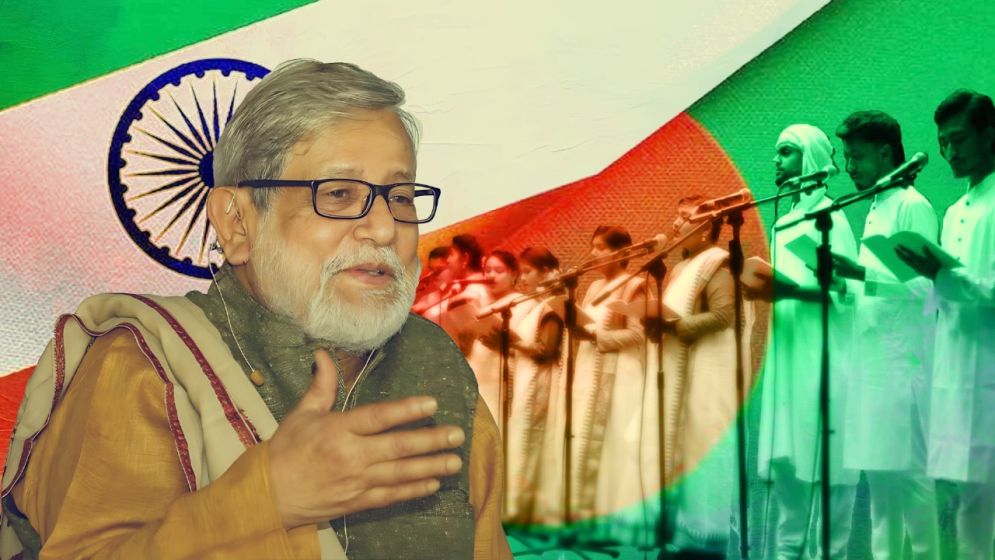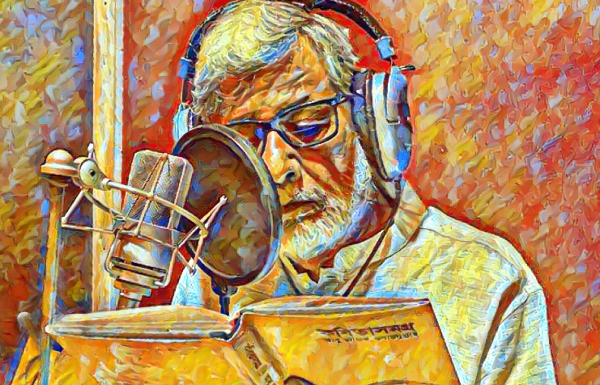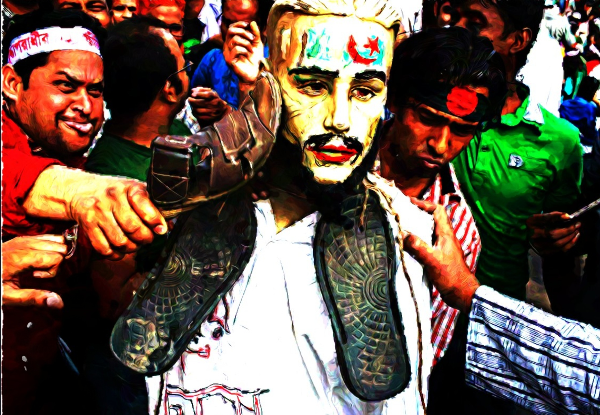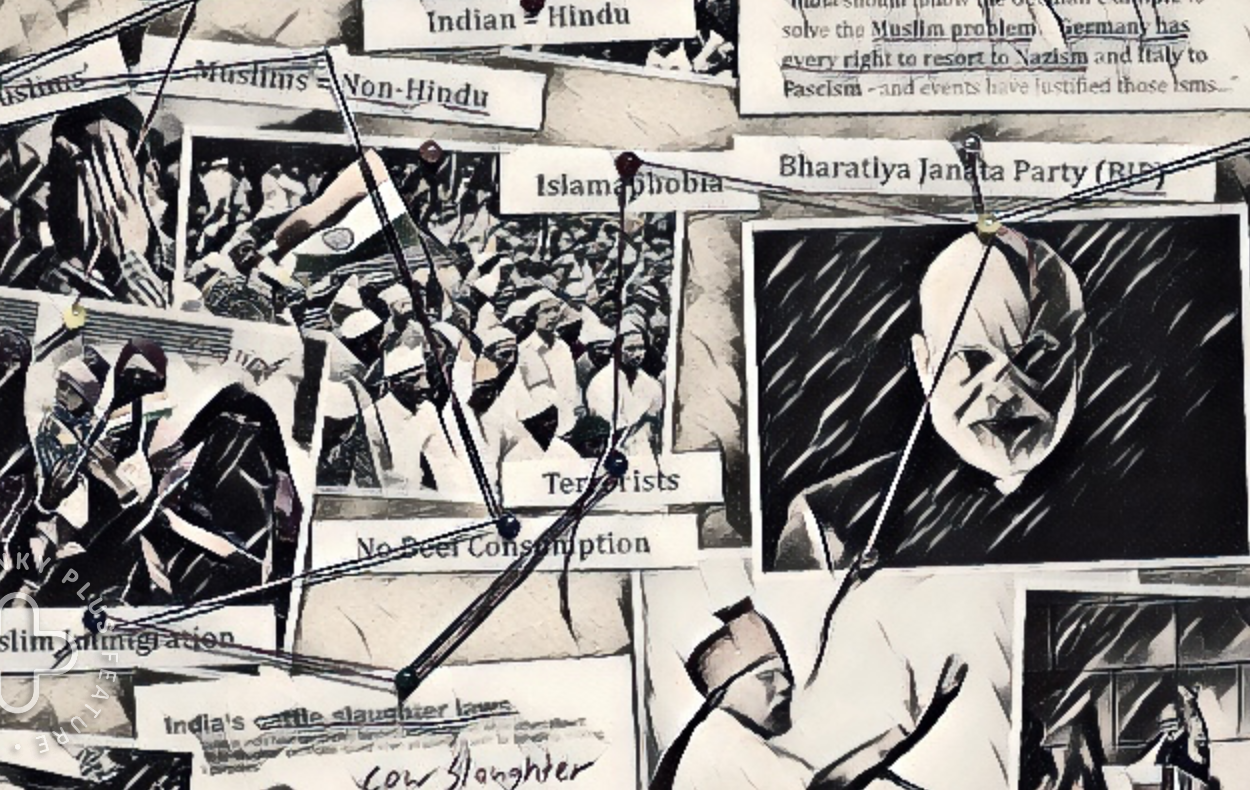Poetry recitals, Asaduzzaman Noor and the creeping India-sponsored cultural fascism

Either in 2017 or 2018, while I was engrossed in learning flamenco guitar, I had this idea: wouldn't the "rasgueado" technique blend beautifully with recitation?
I reached out to a childhood friend, a respected reciter in a local group. (Or maybe he contacted me, memory's a bit fuzzy).
He mentioned an upcoming program where they needed guitar accompaniment for a poem and invited me to rehearsal. So, off I went.
The rehearsal space was a massive floor in an upscale residential area, owned by the organization itself. I was pleasantly surprised. Knowing the financial struggles many cultural groups face, it was heartening to see a recitation organization thriving enough to have such a place.
They gave me free rein with the guitar part for the poem, which was music to my ears. I was thrilled, and so were they.
Being surrounded by culturally-aware people, everyone conversing in refined Bengali, was delightful. I attended rehearsals for a few days, but something started to feel amiss.
During that period, Bangladesh was witnessing numerous movements protesting various injustices against the people (like the quota movement, safe roads, etc.).
Yet, here was this esteemed recitation organization, in the crucial years of 2017-18, practicing poems where everyone, from young to old, echoed the same old messages against communalism and fundamentalism and folk songs. It felt out of touch with the reality outside.
"Let’s stop fundamentalism,
Let’s stop communalism,
There should be justice for war criminals,
No place for traitors in this land.
We will build a secular Bangladesh in the spirit of independence"—and so on.
Their poems made no mention of the struggles of ordinary people or the current movements. No reference to the quota reform protests or the demand for safer roads.

The moment of reckoning
My friend's recitation group was quite large and influential, with bustling morning and evening practices attended by numerous culturally important members who shape societal narratives.
I, however, didn't think much about it. The cultural scene in Bangladesh often feels disconnected from the realities of the people, sticking to established narratives—this is not unusual.
But the day of the program brought a twist. Arriving at Shilpakala Academy with my guitar that afternoon, I was greeted by a grand event with banners everywhere.
One caught my eye: the Indian High Commission was a major sponsor, and the Indian High Commissioner was listed as a guest of honor, prominently featured on the banner.
This felt incredibly wrong. Communalism and the spirit of the Liberation War are well-known political tools in Bangladesh. It's one thing for a cultural worker to utilize them based on their political beliefs, but receiving funding from the Indian High Commission crosses a line.
The chief guests included Asaduzzaman Noor and members of what seemed to be the Bangladesh Recitation Council, which raised further alarm bells.
I actively avoid associating with such individuals, let alone accepting their patronage. Samir Amin's words about fascism creeping into society and the need to avoid any dealings with it resonate deeply with me.
I strictly adhere to this principle; I refuse to engage with fascists. I informed my friend about a "technical issue" that prevented me from performing. Thankfully, our long-standing friendship meant he understood my unease and assured me it wasn't a problem.
Nevertheless, I watched the entire program from the back.
Another childhood friend, a cultural worker himself but apolitical and without any political leanings (the renowned actor Nasiruddin Khan, whose name I couldn't disclose earlier for safety reasons), was also present.
During a tea-break, I inquired, "What's the deal?" He simply stated, "These are all paid by India," gesturing towards the owner of the recitation organization and a few others, suggesting they had substantial wealth but no clear sources of income.
When I pressed further, he just said, "Everyone knows."
This reminds me of another anecdote. I often hear stories about various individuals. A friend once mentioned meeting a well-known online leftist leader at a party in India, where this leader was apparently acting as an agent and discussing the offers he received.
I never refer to such things because they are second-hand information, and I can’t verify it. So, I only discuss what I can verify, even though in many cases I can’t mention names to maintain privacy.
A newspaper editor from Chittagong was telling me that 25% of the journalists in his city receive regular payments from the Indian embassy. This was straight from the horse's mouth.
I asked him, "How is that possible?" He said, "What we pay them isn’t enough."
As a result, the embassy regularly pays select individuals. They receive payments from the embassy under the pretext of various programs.
A substantial amount of funding for the cultural sector comes from India, not just from journalism. This support is often channeled indirectly through cultural activities such as events in India, embassy-sponsored programs, invitations to embassy meetings, and sponsored publications.
These programs largely use cultural avenues to promote their [Indian’s] aims.

The creeping cultural fascism
The historical narrative of recitation in Bangladesh, as I read last year, positions it as a cultural movement against fundamentalism, communalism, and forces opposing independence. Those involved in this history are typically left-leaning leaders or members of leftist cultural groups.
This however isn't an issue. Their active opposition to fundamentalism, communalism, and anti-independence sentiment is commendable.
But the problem is that some critical figures in this history are currently the biggest beneficiaries of the Awami League and are supported by the Indian establishment.
In that program, the leader of the Bangladesh Recitation Coordination Council stated loudly, "We have won, Noor Bhai. We have won. One day, we had to save you from the hands of the fundamentalists." (He recounted an incident of an attack.) "Where are they today? We have made you a minister. We came here in a Pajero."
I can’t recall his words verbatim, but that kind of rhetoric struck me hard at the time, and I remember it clearly, even with my weak memory.
The Indian High Commissioner also attended the event and spoke about the importance of combating fundamentalism and communalism, particularly among Bangladeshi youth.
Some might find it noteworthy that leaders of the Bangladesh Recitation Coordination Council were present at an event with the Indian High Commissioner, especially given allegations of Indian interference in Bangladeshi elections.
The sponsorship of the event, along with the presence of the leaders, made it clear that the group was receiving support from India.
This interpretation doesn't require a conspiracy theory or financial evidence. Some might argue that truly patriotic leaders would assert Bangladesh's ability to address its own issues of fundamentalism and communalism, without needing input from India.
It seems they happily accept Indian involvement in Bangladesh.
After looking into their backgrounds, I discovered that most of them are leaders within the CPB, Student Union, or other leftist parties.
You might wonder if my friend [whom I referred to earlier], a respected reciter, is also paid by the Indian embassy.
No, he is just a humble, patriotic individual who works diligently to earn a living. He has a deep passion for recitation and dedicates his free time to promoting the art of poetry recital.
While some leaders in his organization receive payments for events or donations, he doesn't concern himself with that.

The Indian presence, but not in the
way we think
It's widely understood in cultural circles that certain influences have become normalized. During Shahbagh movement, I argued that the Awami League was controlling the narrative, while many participants were unaware of the underlying political dynamics.
Today, it’s an established belief among the general populace that the Indian High Commission has significant influence over numerous cultural organizations. While some acknowledge India's presence in Bangladesh, they often view it as covert, akin to a spy thriller.
However, the reality is more nuanced.
India's influence operates primarily through cultural channels. Concepts like anti-fundamentalism, the spirit of independence, and secularism are often leveraged to promote this influence.
I'm often asked about the source of the left's power. I believe it lies in their cultural messaging around issues like fundamentalism and communalism. These narratives didn't arise spontaneously; they've been cultivated and promoted.
Tracing the funding often reveals that, in many instances, the Indian embassy has been providing support for a considerable period. I've personally witnessed one such case.
The individuals involved are all associated with leftist movements or identify as leftists. None of them align themselves with the Awami League.
I'm raising this point because, during a recent debate with a friend of mine, I observed that he didn't differentiate between the cultural and ideological aspects of authoritarianism and fascism.
He categorized BNP, Ershad, and Sheikh Hasina as fascists.
However, I believe he overlooks the fact that Ershad was primarily a military dictator. Fascism necessitates a powerful cultural apparatus, which Ershad lacked.
In conclusion, I hypothesize that the traditional concept of "R" is no longer present in Bangladesh.
This is due to the cultural establishment's significant role in shaping societal norms and values, which in turn legitimizes their political allies while delegitimizing the opposition. In Bangladesh, these establishments are already aligning with narratives promoted by India.
If a country can be influenced through cultural mediums such as music and recitation, then investing in traditional intelligence operations appears to be akin to scattering pearls in the ocean.
—-
Zia Hassan is a writer and analyst

